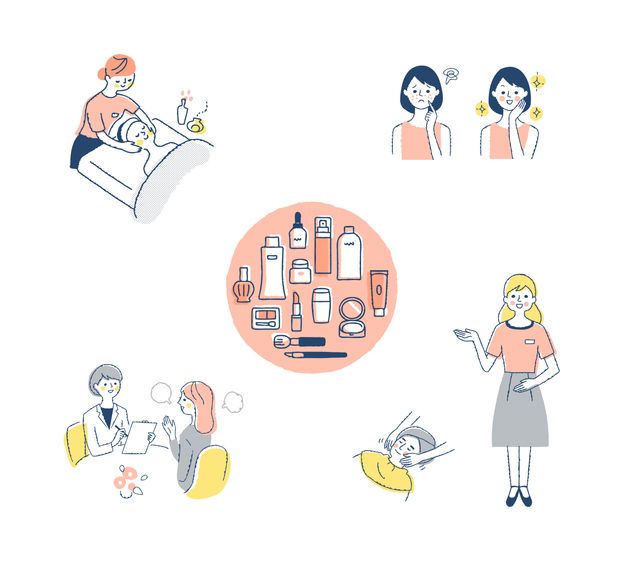

Book Now to Experience
F8 Hair Regrowth Treatment
1 Minute Self-Registration
Date should not be before minimal date
Author: Leila Tan|Updated: 23 July 2024
Many guys aspire to be physically attractive by virtue of their full, healthy heads of hair. However, learning the ins and outs of hair development and figuring out how to stimulate it effectively can be a challenging endeavour. We'll look at what affects hair growth, how to stimulate growth in a number of ways, and how to keep your hair healthy and strong.

1
These Early Signs Can Tell You Your Hair Condition
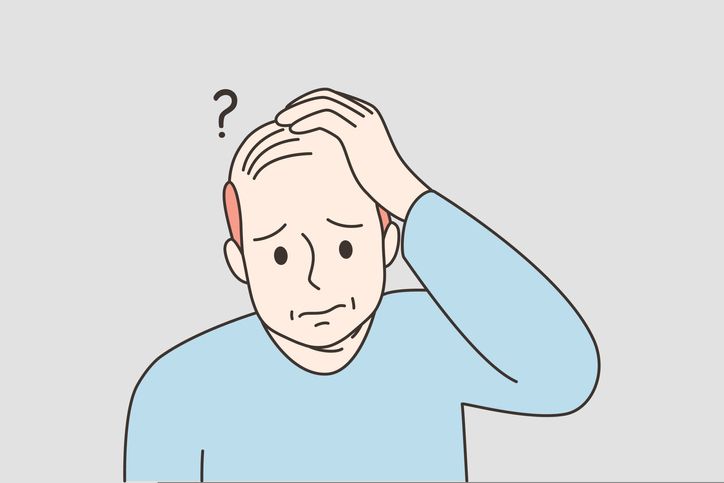
Hair loss in men can manifest in various ways, and recognizing the early signs is crucial for timely intervention. Here are some early signs of hair loss in men to be aware of:
Receding hairline
A receding hairline is one of the first signs of hair loss in guys. Most of the time, it starts with the hairline at the temples going slowly back, making a "M" shape. Over time, the thinning hairline may stand out more.
Thinning crown
Hair loss or thinning at the crown of the head is another early sign. You may notice that your part is getting wider or that there are less hairs in that area.
Increased hair shedding
Pay attention if you lose a lot of hair when you shower, brush your hair, or style it. Even though it's normal to lose some hair every day, clumps of hair in your hands or on your pillow may be a sign that you're starting to lose hair.
Visible scalp
As hair loss gets worse, the thinned hair may make the scalp more noticeable. You may be able to see the skin in some places, especially in the front or on the crown.
Changes in hair texture
Some people who lose hair also have changes in how their hair feels. The hair may thin out, get weaker, or be more likely to break.
Reduced Hair Density
If your hair is getting thinner all over, especially in certain places like the temples, crown, or top of the head, it could be an early sign of hair loss.
Remember that everyone's hair grows in a different way and that some hair loss is a normal part of the hair growth cycle. If you notice, however, that your hair loss is continuous and getting worse, it may be time to see a dermatologist or other hair health expert. Early intervention can generally offer better results in managing and treating hair loss, and they can examine your condition, establish the underlying cause of hair loss, and recommend appropriate treatment options based on your specific case.


2
Hair Phases: How They Affect Your Hair Growth?
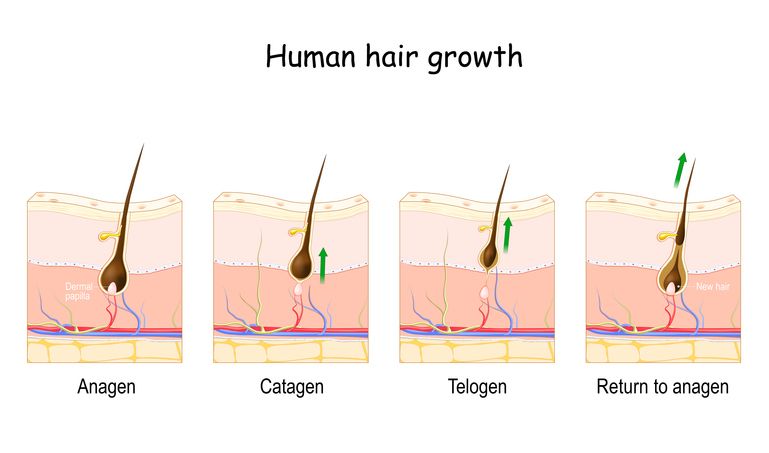
Now that you know about the signs, there is some science you have to understand before getting into how to make hair grow faster, it's important to know how hair grows in the first place. Each hair comes from a hair follicle that is under the skin of the head. Hair grows in stages that include three phases:
Anagen (Growth phase)
During this time, hair follicles are actively producing new hair. Depending on factors including heredity and health, its average lifespan is anything from two to seven years. During this time, hair grows at a rate of around half an inch every month.
Catagen (Transition phase)
After the anagen phase, the hair cells go through a short transitional phase called the catagen phase. It lasts between two and three weeks. During this time, the hair cells get smaller and stop getting blood. The hair stops growing and becomes club hair, which is hair that is fully grown but is no longer growing.
Telogen (Resting phase)
The hair follicles rest during the telogen phase, which comes after the catagen phase. It lasts between two and four months. During this time, the club hair stays in the shaft while new hair starts to grow underneath it. At any given time, about 10–15% of hair follicles are in the telogen phase.
The hair cells go back into the anagen phase after the telogen phase, and the cycle continues. It's important to remember that the length of each phase can vary from person to person, and that changes or shifts in the hair growth cycle can cause hair loss or other hair problems.
Read More

3
Factors that Affect Hair Growth: How They Can Jeopardise Your Hair Growth Journey
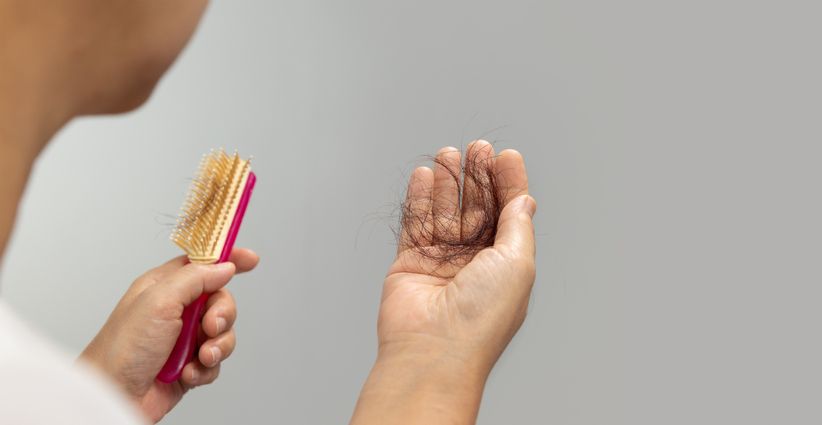
Genetic factors
The patterns of hair growth are mostly predetermined by genetics. Due to inherited causes, some men's hair grows more slowly or thinly than others. The anagen phase's length and hair follicles' responsiveness to hormones can be influenced by genetics, which in turn affects hair density and quality.
Hormonal factors
Hormonal imbalances can have a substantial impact on male hair growth. Dihydrotestosterone (DHT) is a testosterone derivative that can attach to hair follicles, causing them to shrink and create thinner hair. Male pattern baldness is frequently associated with an excess of DHT, which can impede hair growth and lead to hair loss.
Nutritional factors
For good hair growth, you need to eat well. A well-balanced diet full of important vitamins, minerals, and fats gives your hair the building blocks it needs to be strong and healthy. If you don't get enough biotin, zinc, iron, or vitamin D, for example, your hair cells will be weaker, and your hair won't grow as well.
Stress and lifestyle factors
Hair growth can be stunted by things like chronic stress, poor habits, and the environment. The hair development cycle can be thrown off by extreme stress, making hair loss more likely. Hair follicles can also be damaged by habits like smoking, drinking excessively, and being exposed to toxic chemicals and toxins.
Healthy diet and hydration
Optimal hair development begins with a healthy diet and enough water. The scalp and hair follicles benefit from a diet high in foods rich in vitamins A, C, E, and the B-complex, as well as minerals like zinc and iron. Hair can be protected from dryness and breakage by drinking enough water to keep the hair shafts moist.
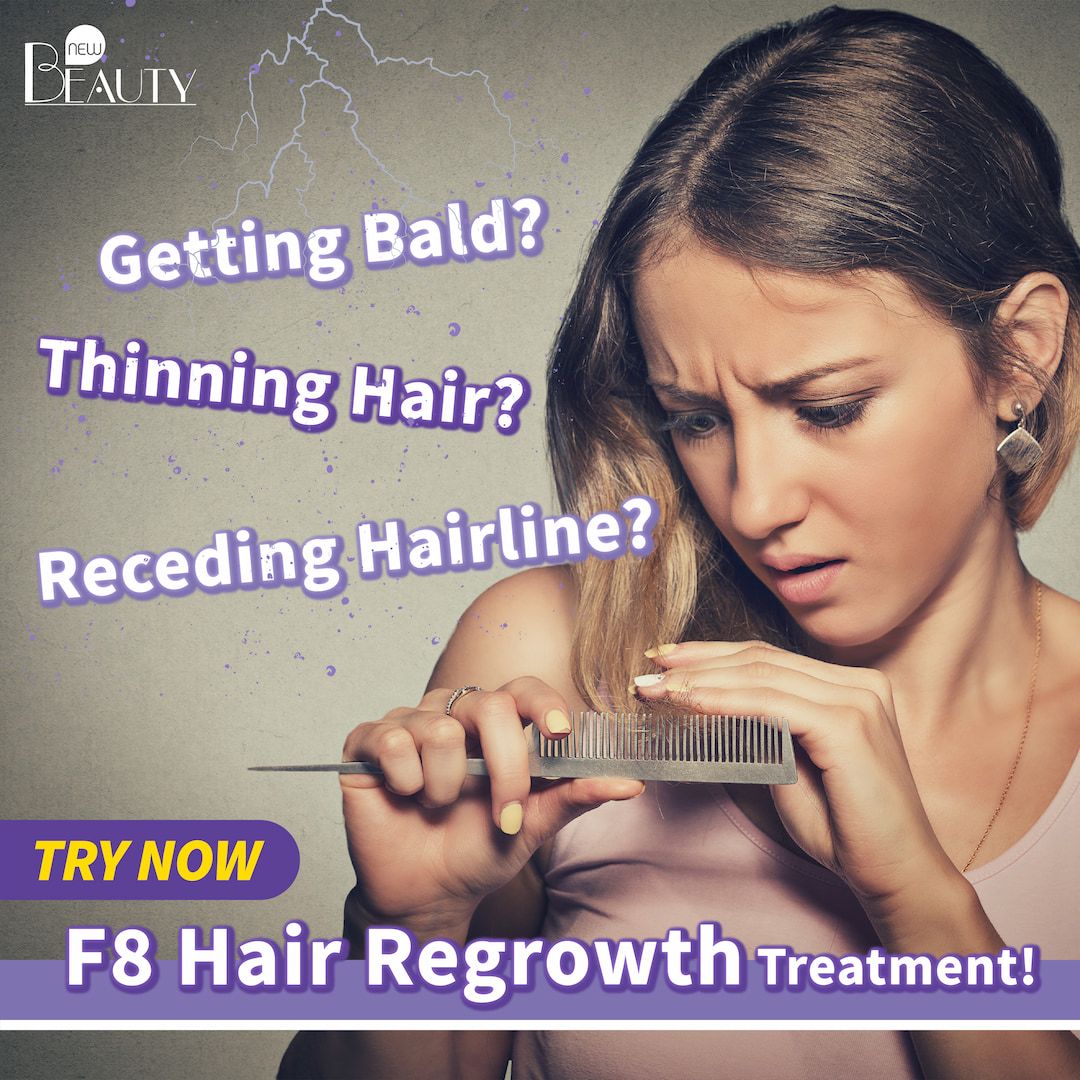

4
Give your Hair Some Perks to Enhance Hair Growth!
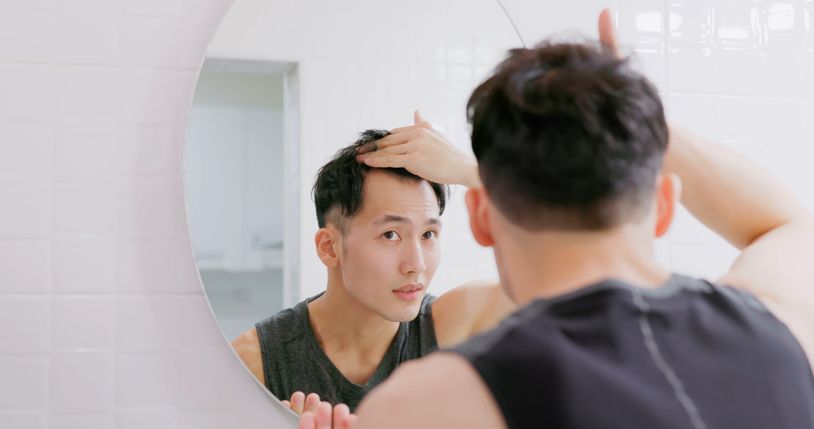
Scalp care and massage
Taking care of your head and massaging it on a regular basis can help get more blood to the hair follicles, which will help your hair grow. Using a shampoo and conditioner that are gentle and right for your hair type helps keep your skin healthy. Massaging the scalp in a circular manner with your fingertips increases blood flow, which feeds the hair follicles and helps hair grow.
Use of hair growth products
There are many items on the market that can help your hair grow, from shampoos and conditioners to serums and oils. Ingredients like minoxidil, biotin, and keratin, which are often found in these products, can help nourish the skin, strengthen the hair, and speed up hair growth. To get the best results, it's important to choose items that are made for men's hair and to follow the directions.
Medications and supplements
Some guys choose to use pills or supplements to make their hair grow faster. Prescription drugs like finasteride may help stop the body from making DHT, which can stop hair loss and help hair grow back. Biotin, saw palmetto and marine collagen are also dietary products that can help hair grow in a healthy way. Before starting a new medication or supplement, it's best to talk to a healthcare expert.
Regular trimming and styling
To keep hair growing in a healthy way, it needs to be trimmed regularly. Every few weeks, trim the ends of your hair to stop split ends and damage. This lets your hair grow longer and stronger. Also, choosing haircuts that don't put too much stress or tension on the hair, like loose braids or natural styles, can help hair grow better.

Book Now to Experience
F8 Hair Regrowth Treatment
1 Minute Self-Registration
Date should not be before minimal date

5
Hair Growth Therapies & What Are They Gonna Do To Your Head
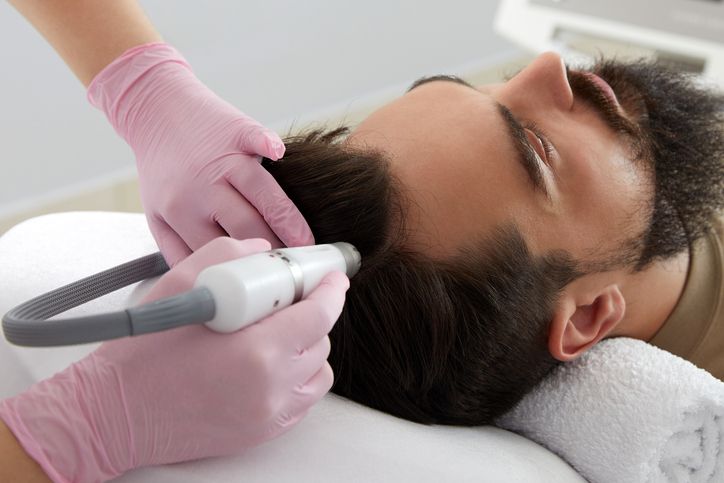
The term "hair growth therapy" refers to a broad range of procedures and strategies intended to encourage and restore hair growth. Here are a few typical approaches:
1. Laser therapy
In order to stimulate hair follicles, low-level laser treatment (LLLT) makes use of specialised instruments that generate red light. In both men and women, this non-invasive procedure has the potential to stimulate hair growth and increase hair density.
2. Platelet-rich plasma (PRP) therapy
PRP therapy entails taking a patient's own blood and processing it to concentrate the platelets. Following that, platelet-rich plasma is injected into the scalp to stimulate hair development and improve hair thickness and density.
3. Hair transplant surgery
Hair follicles are surgically transferred from areas of healthy hair development (donor site) to areas of thinning hair (receiver site) during a hair transplant operation. Those with extensive hair loss or baldness might benefit greatly from this surgical procedure, as it provides a permanent treatment.


6
What Your Hair Needs to Watch Out for?
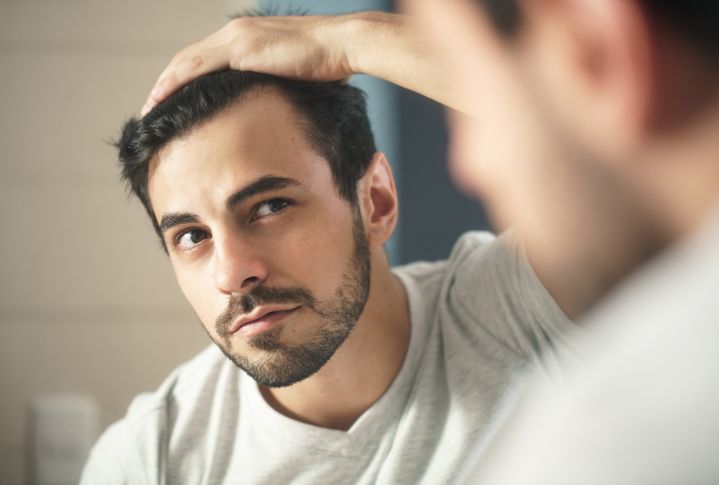
Avoiding excessive heat and chemicals
Too much heat from hair dryers, straighteners, and curling irons, as well as chemical treatments like perming or colouring, can damage the hair shafts and weaken the strands. For healthy hair growth, it's important to use heat styling tools as little as possible and choose gentle, natural hair care methods instead. Embracing your original hair texture and staying away from harsh chemicals can keep damage from happening.
Protecting hair from environmental damage
Some things in the environment, like the sun, smog, and bad weather, can damage hair and make it grow slower. To protect your hair from the sun's dangerous rays, you could wear a hat or wrap it in a scarf. Using safe hairstyles and products that protect your hair from UV rays and the environment can help keep your hair healthy and full of life.

7
Demystifying Hair Growth Myths for Men: Facts vs. Fiction

Asides from the external factors mentioned above, when it comes to men's hair growth, there are a lot of myths and wrong ideas out there. Let's bust some popular myths about how men's hair grows:
Wearing hats or caps leads to hair loss
Fact: Putting on hats or caps does not cause hair loss on its own. Most of the time, hair loss is caused by genetics, hormonal issues, and other underlying health problems. Hats and caps may make your hair look a little different for a short time, but this does not cause lasting hair loss.
Shaving your head makes hair grow back thicker
Fact: Shaving your head doesn't change how thick your hair is or how fast it grows. The blunt edge of the hair shaft makes hair look bigger after shaving. But the real thickness and rate of growth haven't changed.
Using hair styling products causes hair loss
Fact: When used as advised, hair styling products do not cause hair loss. But some harsh chemicals and too much heat can hurt the hair shaft and cause it to break. To keep hair healthy, it's important to use good products and stay away from too much heat.
Only older men experience hair loss
Fact: Even though hair loss is more often seen in older men, it can happen to men of any age. The most common type of hair loss in men, called male pattern baldness, can start as early as the teen years or early twenties. Hair loss can be caused by things like genes and changes in hormones.
Hair loss is solely determined by the mother's side of the family
Fact: Hair loss can run in families on both the mother's and father's sides. Hair loss genetic reasons can be complex and controlled by several genes from both parents.
Massaging the scalp with oils or special treatments promotes hair regrowth
Fact: Scalp massages and specific oils may enhance blood circulation to the scalp, promoting a healthy environment for hair development. They do not, however, directly stimulate new hair follicles or reverse genetically induced irreversible hair loss.
Men looking for correct information about hair growth should be aware of the truth behind these myths and importantly find methods and treatments to tackle and prevent them as soon as early signs of hair loss appear. If you are interested in a fast and efficient way of regrowing lost hair, we at New Beauty introduce a new hair treatment called F8 Hair Regrowth Treatment.


8
Getting It Back: How New Beauty's F8 Hair Regrowth Treatment Can Help You
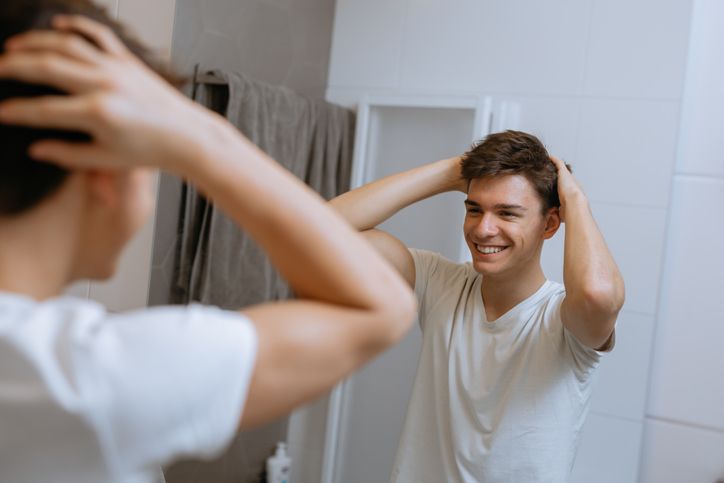
F8 Hair Regrowth Treatment is a safe, natural method for keeping your scalp and hair in good condition. Inactive hair follicles are stimulated and their internal hair papilla is strengthened as low-level laser energy is swept across the scalp. The nutrients that are delivered to the hair follicles via the microcirculation stimulated by the energy and serum. With this technology, both the thickness and the quality of your hair will increase after treatment!
Before the treatment, the professional hair specialist investigates the potential causes of hair loss in the client and also examines the health of the cranium and hair follicles under 200 times magnification. Next, the therapist spreads low-energy lasers across the scalp with the help of the equipment's handpiece. This is a non-invasive procedure. Within, the hair papilla and follicles are stimulated into action. The microcirculation in the area around the capillaries improves, allowing for an adequate supply of nutrients. The end effect is a scalp and hair follicles that feel and look healthier.
After the low-energy lasers have been discharged, the therapist will apply the premium hair growth serum in an even layer all over the scalp. The laser light facilitates rapid absorption of the serum. The sebum secretion is reduced thanks to the hair growth serum, which also cleans the scalp, opens the pores, and moisturises the scalp to provide an optimal environment for hair growth by readjusting the water-oil ratio. Thus, hair growth is promoted by F8 Regrowth Treatment.

Book Now to Experience
F8 Hair Regrowth Treatment
1 Minute Self-Registration
Date should not be before minimal date

9
Final Words
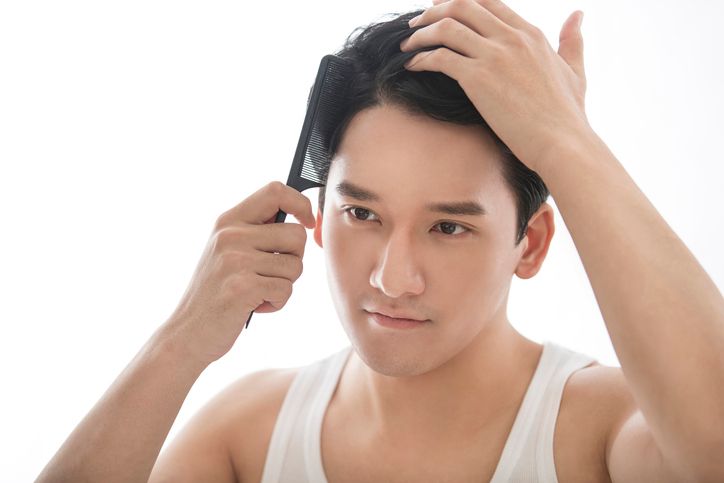
Understanding and applying diverse tactics is necessary on the road to achieving and maintaining healthy hair growth. A man's hair can grow to its full potential if he takes the time to learn about the various aspects that affect it and then applies a comprehensive strategy to caring for his hair so book your F8 Hair Regrowth Treatment now over at New beauty!
FAQ
1. How long does it take for hair to grow?
People's hair grows at different rates, but on average, about half an inch per month. It's important to remember that genetics, health, and how you care for your hair can all affect how fast your hair grows.
2. Are there any natural remedies to stimulate hair growth?
Even though there are no sure-fire natural ways to make hair grow, some people have said that using essential oils like rosemary, peppermint, and lavender has helped. But it's important to use these oils in a safe way and talk to a professional if you need to.
3. Can stress cause hair loss?
Yes, stress that lasts for a long time can cause hair loss. Stress can mess up the hair's growth cycle, which can lead to more hair loss or slower growth. Using relaxation methods, exercise, and self-care to deal with stress can help you have healthier hair.
4. Is hair loss reversible?
In some cases, hair loss can be stopped, especially if it's caused by something brief like a drug, a lack of nutrients, or an imbalance in hormones. But there may not be many ways to treat things like male pattern baldness. Talking to a healthcare worker can help people understand their own situations better.
5. Are hair growth supplements effective?
Hair growth supplements can help your hair stay healthy by giving it the nutrients it needs, but their success varies. Before you start taking supplements, it's important to choose brands with good reputations and talk to a doctor or nurse.

Book Now to Experience
F8 Hair Regrowth Treatment
1 Minute Self-Registration
Date should not be before minimal date
Recommended Articles
COPYRIGHT© NEW BEAUTY MANAGEMENT LIMITED 2025. ALL RIGHT RESERVED.


